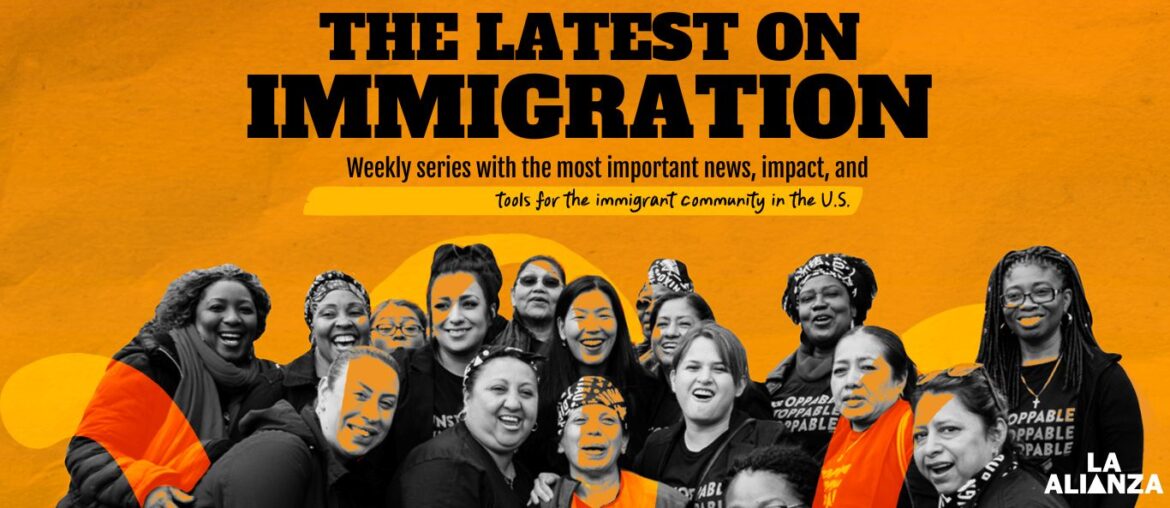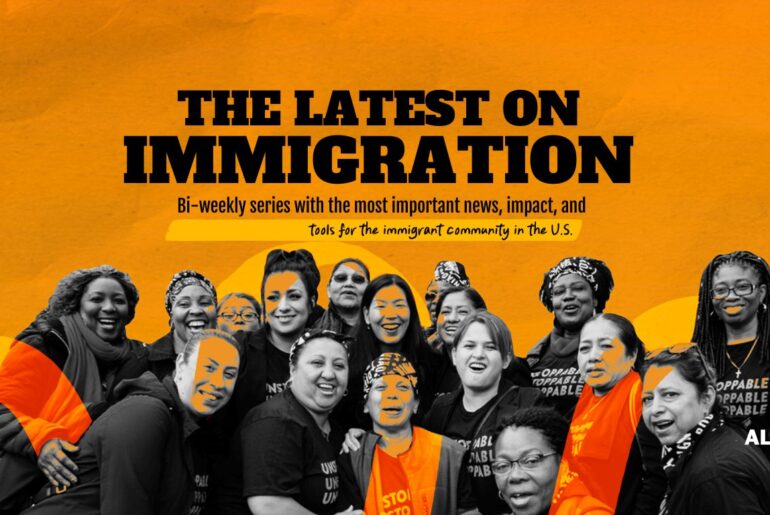This is a summary of the most important immigration news from May 16 to June 4, 2025. These past few weeks, the United States government has intensified measures that directly affect migrant families, including restrictions to access to public services, changes in legal procedures and operations in courts and schools.
Recent News
ICE intensifies arrests in immigration courts: The federal government has doubled down on its detention strategies at immigration court exits.
- What we know: Since mid-May, organizations have condemned an increase in arrests outside immigration courts in several states in the country. The presence of ICE agents has been registered in hallways and exits in at least 22 courts in cities like Phoenix, Santa Ana, New York, and Houston. In these raids, agents dressed in black interrogate people that have just come out of hearings, many of which don’t have lawyers or are in the beginning stages of their asylum processes. Some detentions have included families with children present.
- Why this is important: This practice, condemned by immigration lawyers, breaks with basic norms of due process. Those that comply with their obligation to appear before a judge now face the risk of being detained without previous notice and be positioned in the process of expedited deportation.
- What you can do: Various organizations recommend not signing any document without first consulting a lawyer, avoiding answering questions without legal representation and asking to speak to an advocate before making decisions about your case. In the same manner, a notable resource for these cases is the Immigrant Legal Resource Center (ILRC), that provides the widely known red cards, designed to help people exercise their constitutional rights during encounters with immigration agents. Likewise, the additional resource from Northwest Immigrant Rights Project (NWIRP) about your rights when you or a loved one attend an in-person hearing in a federal immigration court. Available here
- Impact on immigrant communities: These ambushes generate fear and distrust in the judicial system. Many people are considering not going to their hearings, which could worsen their immigration situation. It also affects the mental health and safety of whole families.
Judge stops deportations of people from Venezuela with TPS after Supreme Court decision. A federal judge in California issued an emergency order that temporarily protects certain people from Venezuela with TPS from being deported, despite the recent ruling from the Supreme Court that allows the termination of the program. The measure offered relief to thousands of people that renovated their status on time, but it leaves out people in similar situations.
- What we know: Judge Edward E. Chen, from a federal court in San Francisco, ordered the government to respect work permits and deportation protections for up to 5,000 people from Venezuela that renovated their Temporary Protected Status (TPS) between January 17th and February 5th, 2025. This decision is in response to an emergency motion filed after the Supreme Court ruling that allows the Trump administration to cancel TPS while litigation continues.
- Why this is important: The order protects people from Venezuela that managed to re-register within this window and received official documentation. However, those that re-registered outside this period, even if they complied with the process, could lack coverage. Many of those affected live in Florida, especially in the South of the state.
- What you can do: Check if there are other forms of immigration relief, like asylum or residency on grounds of family ties. People benefited by TPS should consult an attorney to learn about their options. You can access the NDWA attorney directory (NDWA is the partner organization of La Alianza), at the following link: https://www.domesticworkers.org/resources/immigrant-rights/find-legal-help/
- Impact on immigrant communities: The ruling has caused anxiety among those that counted on TPS. The people covered by this measure can keep their work permits and cannot be deported while the order is in effect. Even then, the future of their immigration status depends on litigation outcomes. The lack of clarity around how the government will implement this order causes concern among those that don’t know if they are protected.
Government Seeks to Eliminate Basic Rights for Detained Children: The Trump Administration requested an end to the judicial agreement that requires the government to offer minimal conditions to detained migrant children, like meals, potable water, hygiene, and a limit to confinement hours.
- What we know: The Flores Agreement, in effect since 1997, protects minors in detention centers. The government argues that these rules limit its capacity to detain families and discourage border crossings. Various organizations have alerted about possible violations if the agreement is terminated.
- Why this is important: Without the agreement, children could be detained for an indefinite amount of time and in precarious conditions. Already in previous years, there were documented cases of minors that spent days without access to showers, clean clothing or medical attention.
- What you can do: Families with minors in immigration processes should stay informed about their rights and seek legal assistance. Some organizations that offer free or low-cost support include:
- Legal representation for children and adults detained in Arizona: https://firrp.org/es/
- Resources for locating detained children and obtaining legal aid: https://amicacenter.org/es/obtenga-ayuda/
- Impact on Immigrant Communities: The possibility that these protections could be terminated has caused concern among immigrant parents. Some families are afraid of taking their children to immigration appointments due to fear of prolonged detentions.
ICE Detains Student from Venezuela after Hearing in New York: Dylan López Contreras, a 20 year old young man from Venezuela that went to high school in New York, was detained by immigration agents after attending a court appointment. The case has caused indignation among teachers, parents and human rights advocates.
- What we know: The detention occurred in court hallways, even though the young man was complying with his asylum process. He did not have a criminal background or serious immigration violations. His whereabouts were unknown for several hours.
- Why this is important: The case marks a worrisome precedent. Students that actively participate in school, without a criminal history, could be detained without notice, which undermines trust in institutions.
- What you can do: Those who are in immigration processes should attend accompanied by legal representatives. Schools can connect with organizations like United We Dream, that offer resources about the rights of immigrant students.
Supreme Court Stops Deportations under the Alien Enemies Act: The highest court temporarily blocked the expulsion of immigrants from Venezuela under a 1798 law, recently used by the Trump Administration to justify rapid deportations.
- What we know: The Supreme Court ordered the suspension of deportations while they resolve if the government is violating immigrant rights to being notified and to defend themselves in court. Some were already sent to a jail in El Salvador without a chance to appeal.
- Why this is important: This decision limits, for now, the use of an old law to justify mass deportations without process.
- What you can do: People in deportation process should request immediate legal aid and should be on the lookout for judicial updates. ILRC’s Inmigrante Informado has updated and easy to understand guides about rights and proceedings: https://www.inmigranteinformado.com
- Impact on immigrant communities: The measure has caused fear among detained foreign nationals, especially due to the risk of being sent to maximum security prisons abroad.
Developing Stories and Local News
These are stories and legislation that are developing or in the pipeline. Details could change:
- Concern about Deportations Affects Fiscal Compliance in Latin American Communities: After it was announced that the IRS would share confidential information with the Department of Homeland Security there has been a reported significant decline in tax filing within immigrant communities.
- Trump Proposes Immigrant Reality Show: The Trump Administration explores the possibility of launching a TV program in which participants compete for United States citizenship. Although the proposal is not yet official, it has caused criticism for treating immigration as entertainment. Several organizations consider that this trivializes processes that affect the life and safety of millions of people.
- Global Pause on Interviews for Student Visas: The State Department ordered the immediate suspension of scheduling new interviews for F, M, and J visas in all embassies and consulates in the U.S., while it prepares an expansion of social media analysis. The measure, signed by the Secretary of State Marco Rubio, arrives in the middle of the peak season for requests and could cause massive delays. Universities and experts warn that this pause damages the reputation of the U.S. as an academic destination, and it affects thousands of legitimate students that face strict security checks.
- Congress Analyses a 3.5% Tax on Remittances: A legislative proposal seeks to apply a new tax on the remittance of money by people without citizenship. Experts warn that this measure would affect thousands of families abroad and could lead to many immigrants using less safe informal channels.
- Birthright Citizenship Under Discussion: The Supreme Court is considering a case that could change the constitutional right that guarantees automatic citizenship to any person born in the U.S., no matter the immigration status of their parents. Even though there is still no decision, the topic has caused worry among immigrant families.
The Numbers
- 49,189 people are under ICE custody, according to the latest official report.
- The U.S. has increased the number of jails that house immigrants by 30% so far this Fiscal Year 2025. In April, there were at least 144 centers with people detained by ICE, in comparison to 111 at the beginning of the Fiscal Year in October of 2024.
- Four detention centers house more than 10% of all the immigrant population detained by ICE: Natchez (MS), Lumpkin (GA), Pearsall (TX) and Winnfield (LA). Each one holds between 1,500 and 2,100 people per day.
RESOURCES
- For more help, visit the National Domestic Workers Alliance’s “Know Your Rights” hub. It includes immigrants’ rights, immigration options, and a legal aid directory, among other resources. To access the information, visit ndwa.us/immigrant.
Note: The National Domestic Workers Alliance is the partner organization of La Alianza
- To identify reliable information, visit: How to identify fake news about immigration and avoid misinformation.
Legal Disclaimer: This information is provided for educational purposes and does not constitute legal advice. It is recommended that you consult with an immigration attorney to assess your specific situation.


